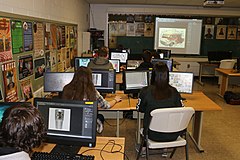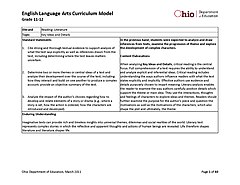Twelfth grade
This article needs additional citations for verification. (May 2009) |

Twelfth grade (also known as 12th grade, grade 12, senior year, or class 12) is the twelfth and final year of formal or compulsory education. It is typically the final year of secondary school and K–12 in most parts of the world. Students in twelfth grade are usually 16-18 years old. Some countries have a thirteenth grade, while other countries do not have a 12th grade/year at all.
Australia
[edit]In Australia, the twelfth grade is referred to as Year 12. In New South Wales, students are usually 16 or 17 years old when they enter Year 12 and 17 or 18 years during graduation (end of year). A majority of students in Year 12 work toward getting an ATAR (Australian Tertiary Admission Rank). Up until the start of 2020 the OP (Overall Position, which applies only to students in the state of Queensland) was used.[1] Both of these allow/allowed them access to courses at university.[2][3][4][5] In Western Australia, this is achieved by completing the WACE; in South Australia, this is achieved by completing the SACE; in Victoria, this is achieved by completing the VCE; in the Australian Capital Territory, this is achieved by completing the AST[6] and in New South Wales this is achieved by completing the HSC.[7]
Bangladesh
[edit]In Bangladesh, educational institutions offering the 11th–12th grade education are known as colleges. In the 12th grade, students study in one of the three streams: science, humanities, and business studies.[8] After completing 12th grade, they have to sit for the Higher Secondary Certificate (HSC) examinations.[9]
Finland
[edit]The twelfth grade is the third and usually last year (a fourth-year is possible) of high school or secondary school (or Gymnasium). The students graduate from high school at around 18, with some 17 or 19. The twelfth grade is shorter than previous because the twelfth graders' lessons end in February and they go on to take their final exams shortly afterward. Compulsory education ends after the twelfth grade, and it is completely optional for a student to continue into fourth-year.[10]
France
[edit]The equivalent grade in France is Terminale. It is the third and last year of lycée (the French equivalent to high school), whereby students must sit a test called the Baccalauréat to complete the year. French-language schools that teach the French government curriculum (i.e. are part of the AEFE network) use the same system of grades as their French counterparts. This is not compulsory, as education in France is only compulsory until students turn 16.[11]
Lebanon
[edit]
In Lebanon, twelfth grade is the third year of high school, also referred to as the third year of higher secondary education, the class of seniors, or the last class of the school. Students in twelfth grade in Lebanon are between the ages of 17 and 18.[12]
Netherlands
[edit]In the Netherlands, senior year is named by the school level. From low to high: "VMBO", "HAVO" and "VWO". VMBO is composed of four years, with 12th grade being the fourth (4th) and final year. A higher school level is the HAVO, which lasts for five years. The highest school level is VWO, which lasts for six years. So at the HAVO, students are considered senior if they are in "5th class", whereas at VWO, in "6th class" respectively. The last year mainly focuses on preparing for the final exams, after which students should be ready to go to college or university. Usually, 4th and 5th grade students are aged 16 to 17 and those who are in 6th grade usually are aged 17 to 18.[13]
New Zealand
[edit]In New Zealand, 12th grade is known as Year 13 (New Zealand students attend 13 years of school, starting at the age of 5). Students in Year 13 are usually 17–18 years old. This is the last year of secondary school. In Year 13, students complete NCEA Level 3, which involves getting a certain number of 'credits' from different external exams and other internal assessments. Students must gain 80 achieved credits or higher (20 of which are taken from Level 2) to pass the year.[14]
Philippines
[edit]
In the Philippines, Grade 12 or Ultimate Year is the final year of Senior High School and High School curriculum under the new K–12 that was first implemented on April 24, 2012, as part of the curriculum's 9-year implementation process from May 20, 2008, to June 5, 2017. It is also the last year of high school, and the basic and compulsory education in the country before graduates choose to enter tertiary education (e.g. college or university, which are both used interchangeably), entrepreneurship, or employment. Students are usually 17–18 years old.[15]
The last school year to fully use the 1945–2017, or K–10 system, was SY 2011–2012. Kindergarten was made obligatory, which served as a requirement for the implementation of K–12 and process of phasing out the K–10 on April 24, 2012, and part of the K–12's 9-year implementation process. The other grades are still the same as before (Grade 1 to Fourth Year), while the last to use this system is SY 2016–2017. By the said school year, Grade 6 is the only grade that is still under the 1945 K–10 system, while the rest are now under K–12.[16]
Subjects on Grade 12 are enrolled on a semestral basis as in Grade 11. Afterwards, Grade 12 students will take the last National Achievement Test called the Basic Education Exit Assessment, although this is not a requirement for graduation or college enrollment.[17] Finally, graduation rites are held, being the next grade to do so after Grade 6 for elementary school graduates.[18]
United Kingdom
[edit]England and Wales
[edit]In England and Wales, "Year 13" (or "upper Sixth") is the last year of A-Level certifications which are completed to finalize a student's last academic year. Students are usually 16–17 in Year 12 and 17–18 in Year 13. While the school leaving age in the rest of the UK is 16 years old, in 2015 education in England became compulsory until the age of 18.[19] After this age, students can leave education if they choose without necessarily completing year 13. Between the ages of 16 and 18, students can either continue in full-time education (for example, at a sixth form college); start an apprenticeship or traineeship; or spend a minimum of 20 hours per week working or volunteering while in part-time education or training.[20] Any education after the age of 18 is then referred to as higher education.
Scotland
[edit]In Scotland, this is the sixth year (or S6). Sufficiently good marks in 5th year may be adequate for entry into higher education. 'Highers' are the entry qualifications to university which can be sat in S5, S6 or college, with Advanced Highers equivalent to year one of university.[21]
United States
[edit]
This section needs additional citations for verification. (October 2024) |
The twelfth grade is the twelfth school year after kindergarten. It is also the last year of compulsory secondary education, or high school. Students are often 16-18 years old, and on rarer occasions, can be 19 years old or older. Many states have a maximum age which free education can be offered, usually but not always age 21.[22] Twelfth graders are referred to as Seniors.
Traditions associated with senior year
[edit]Senior skip day (also known as senior ditch day) is a day during which the seniors do not attend school and skip all their classes. This event/tradition is often not recognized by school administrations and teachers. In some areas it is countered with an officially recognized senior day off, or by allowing graduating seniors to skip their final exams. This official senior day can also be used to sponsor a senior field trip or senior class trip where the class would, for example, go to a theme park, a lake, a resort, the beach, or some other vacation-type activity. Following graduation, many seniors go on senior week, where they spend a week at the beach with their friends.[23]
See also
[edit]References
[edit]- ^ "ATAR".
- ^ Garnett, Patrick (13 January 2018). "Year 12 Student Achievement Data 2017" (PDF). www.scsa.wa.edu.au. Archived from the original (PDF) on March 19, 2018.
- ^ Queensland Curriculum & Assessment Authority, Queensland Government (13 January 2018). "2016 Data summary" (PDF). www.qcaa.qld.edu.au.
- ^ View Table 3.: 56.8% of Year 12 students receive an ATAR http://www.mitchellinstitute.org.au/wp-content/uploads/2015/11/Educational-opportunity-in-Australia-2015-Who-succeeds-and-who-misses-out-19Nov15.pdf Lamb, S, Jackson, J, Walstab, A & Huo, S (2015), Educational opportunity in Australia 2015: Who succeeds and who misses out, Centre for International Research on Education Systems, Victoria University, for the Mitchell Institute, Melbourne: Mitchell Institute.
- ^ Figure 3.25, Page 37 indicates that under 50% of Year students receive an ATAR score. http://www.cese.nsw.gov.au/state-of-education/images/pdf/school_education_AA.pdf
- ^ "ACT Scaling Test". Archived from the original on 2014-03-11. Retrieved 2014-04-17.
- ^ "Cost/Benefit Analysis Relating to the Implementation of a Common School Starting Age and Associated Nomenclature by 1 January 2010" (PDF). Atelier Learning Solutions Pty Ltd. Archived from the original (PDF) on 25 February 2009. Retrieved 2009-01-10.
- ^ "HSC registration begins June 29, no eligibility tests in colleges". The Financial Express. Retrieved 2021-07-17.
- ^ Staff Correspondent. "Students want to return to classes following health guidelines". Prothomalo. Retrieved 2021-07-17.
{{cite web}}:|author=has generic name (help) - ^ "Yle - Finland extends compulsory schooling age to 18".
- ^ Doe, John (2017-10-09). "Organisation of the Education System and of its Structure". Eurydice - European Commission. Retrieved 2020-12-08.
- ^ "الموقع الرسمي لوزارة التربية والتعليم العالي" (in Arabic). Archived from the original on 2016-06-03. Retrieved 2016-05-25.
- ^ "The education system in the Netherlands". Expatica. Retrieved 27 June 2022.
- ^ "NCEA levels and certificates". Nzqa.govt.nz. Retrieved 20 December 2017.
- ^ "K-12 Primer as of 20 December 2011" (PDF). Department of Education. Archived from the original (PDF) on 2012-05-22. Retrieved 28 April 2012.
- ^ "Filipino Community Profile – Ethnic Council of Shepparton and District". Retrieved 2019-06-09.
- ^ "NAT12 not a requirement for graduation: DepEd". Manila Bulletin News. Archived from the original on March 26, 2018. Retrieved 2018-04-18.
- ^ "DepEd postpones high school, elementary graduation rites nationwide". CNN Philippines. Archived from the original on April 18, 2020. Retrieved 2020-04-22.
- ^ "Education leaving age". politics.co.uk. Retrieved 2020-12-08.
- ^ "School leaving age". GOV.UK. Retrieved 2020-12-08.
- ^ "SQA". Sqa.org.uk. Archived from the original on July 14, 2007. Retrieved 20 December 2017.
- ^ "State Education Practices (SEP)". nces.ed.gov. Retrieved 2024-02-07.
- ^ Bryant, Dawn (June 13, 2002). "Senior Week: A blessing, a curse". Morning Star. Wilmington, NC. Knight Ridder. p. 7B. Retrieved February 18, 2013.
